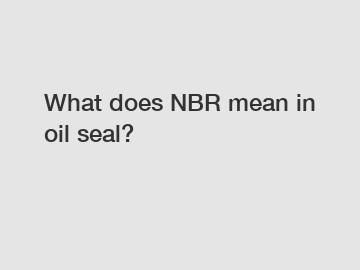What does NBR mean in oil seal?
What does NBR mean in oil seal?
NBR stands for Nitrile Butadiene Rubber, which is a synthetic rubber compound commonly used in the manufacturing of oil seals. This material is highly resistant to oil, fuel, and other petroleum-based fluids, making it an excellent choice for sealing applications in automotive, industrial, and aerospace industries.
The origin of using NBR in oil seals can be traced back to the mid-1930s when chemists discovered the unique properties of this synthetic rubber. They found that by combining butadiene and acrylonitrile, they could create a material that exhibited excellent resistance to oil, fuel, and other chemicals, while still maintaining elasticity and durability.

The process of creating NBR involves polymerizing butadiene and acrylonitrile monomers under specific conditions. The ratio of these two monomers determines the properties of the resulting NBR compound. Higher levels of acrylonitrile result in increased resistance to oil and fuel, while lower levels provide enhanced flexibility and resilience.
The significance of using NBR in oil seals cannot be overstated. Oil seals, also known as rotary shaft seals, are critical components used to prevent the leakage of fluids in various applications. They are typically installed to seal the gap between a stationary housing and a rotating shaft, ensuring that oil or other fluids do not escape or enter the system.
NBR-based oil seals offer several advantages over other materials. Firstly, their excellent resistance to oil, fuel, and chemicals ensures long-lasting and reliable sealing performance in demanding environments. This makes them suitable for use in engines, gearboxes, hydraulic systems, and other machinery where exposure to lubricants is common.
Furthermore, NBR seals exhibit good mechanical properties, including high tensile strength, tear resistance, and compression set resistance. These properties enable them to withstand the dynamic forces and pressures encountered during operation, ensuring extended service life and reduced downtime.
Moreover, NBR is a cost-effective material, making it a preferred choice for manufacturers. Its availability, ease of processing, and comparatively low production costs contribute to its widespread usage in the industry.
In conclusion, NBR, or Nitrile Butadiene Rubber, is a synthetic rubber compound widely employed in oil seals. Its exceptional resistance to oil, fuel, and chemicals, combined with its mechanical properties, make it an ideal choice for sealing applications in various industries. The development of NBR as a sealing material has revolutionized the performance and reliability of oil seals, significantly impacting the efficiency and longevity of machinery and equipment.
Are you interested in learning more about best nbr r37 cloth rubber oil seal, rubber o rings wholesale, gasket vs o ring? Contact us today to secure an expert consultation!


